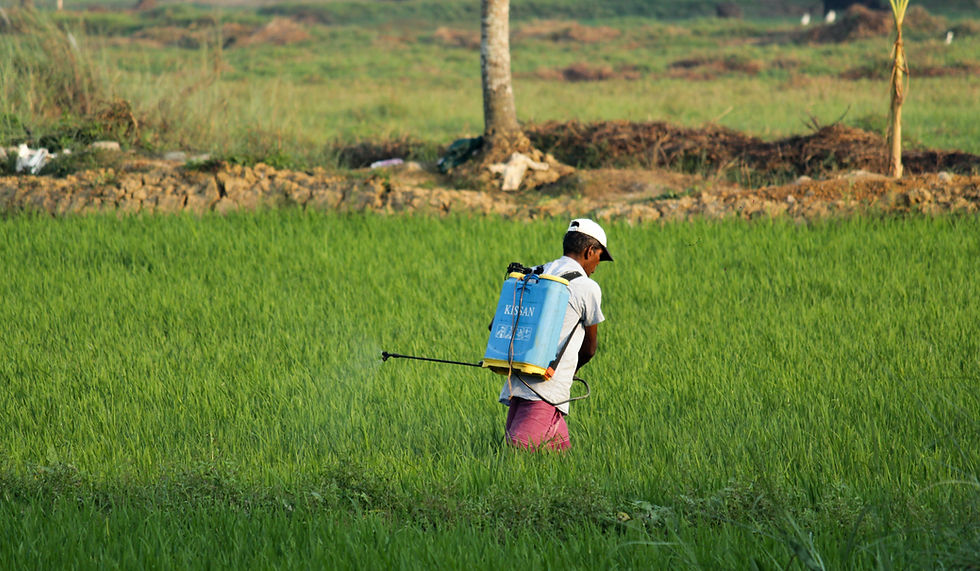How to treat Chinch Bugs in Calgary
- Glen Peters
- Mar 19, 2023
- 3 min read
Updated: Mar 23, 2023

Chinch Bugs are a common lawn pest that can damage grass and cause it to turn yellow or brown. Here are some steps you can take to treat Chinch Bugs:
Identify the problem:
The first step in treating chinch bugs is to confirm that they are the cause of the problem. To do this, you can look for the presence of the bugs themselves or the damage they cause (yellow or brown patches on the lawn).
Chinch bugs can quickly reproduce, with eggs hatching after three weeks in May and June. a adult live an average of 60 days. Chinch bugs gather in groups in a square half metre as many as 200, and can be easily undetected due to their small size.
Some area of your turf, most likely won't recover as easily it will need replacing in areas after complete treatment is done. They are most active during June to early September because of the heat and sunshine. They survive in the winter they take shelter under shrubs, hedges and leave litter.
You can also use a soap solution (1 teaspoon of dish soap mixed with 1 quart of water) to flush the bugs out of hiding. Pesticides free or you can use a pesticide Bio-Advanced Complete Insect Killer for soil and Turf you can mow and water before applying this Chemical this will only kill the Chinch bug after applying Chemical not the Eggs.
Some products require two parts, one to kill the Chinch bug and the second application to kill the eggs, the second application applies several weeks later to kill the eggs. There are other Chemicals on the market that are a slow release protection that will release and remain in turf for up to three months such as Ortho Bug clear Lawn Insect Killer, that hopefully will kill the Chinch bug and the eggs. There are others on the Market.
A safer earth, (chemical-free) earth such as Diatomaceous earth. This product is often added to livestock feed to get rid of the animal's internal parasites. This product partials appear soft, and chalky, it will pierce the bodies of insect that comes into contact with. Diatomaceous earth is also desiccant, this will cause the Chinch Bug when it comes in contact with it to dehydrate and die, typically after a few days.
A few items to how to help Keep Chinch away:
Keep grass about 2.5 inch to 3 inch Long when cutting grass, don't have grass too short. This will also reduce stress on your grass.
Don't over fertilize lawn Chinch get attracted to Lawns with excess nitrogen. Choose a lower nitrogen such as 21 which is the first number on the bag or bottle. Not recommended having grass clippings on Lawn contently due to the nitrogen the Bug strives on.
Water your Lawn heavily, but not too often, maybe once a week.
Lawn Aerating in The Springtime can make your soil less compact and not as inviting for pests or bugs.
If wanting a safer alternative, again as per discussed earlier, you can use soap and water.
Remove weeds and excess thatch: Chinch bugs often hide in weeds and thick thatch, so removing these from your lawn can help to reduce their population.
Water the lawn deeply: Proper watering can help to reduce the population of chinch bugs, as they tend to prefer dry conditions. Water your lawn deeply and infrequently to create a less hospitable environment for the bugs.
Apply an insecticide: If the problem persists, you may need to use an insecticide to kill the chinch bugs. There are a variety of insecticides available for this purpose, including both chemical and natural options. Be sure to follow the instructions on the product label carefully.
Monitor the situation: After treating the chinch bugs, continue to monitor the situation to ensure that the problem has been resolved. If the bugs return or the damage persists, you may need to repeat the treatment process
Any Questions, Please Call:
A Cut Above Lawn and Yard Services
(403) 253-5509
email: info@acutabovelawncalgary.ca




Comments